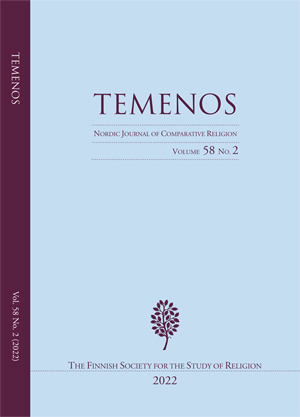A 'Nordic Religious Freedom Paradox'?
Freedom of Religion and Belief as Constructed by Two Global Datasets
DOI:
https://doi.org/10.33356/temenos.113467Keywords:
Freedom of religion or belief, Pew Research, Government restrictions, Religious discrimination, Religious diversityAbstract
Major research initiatives like the Religion and Politics project (RAS) lead by Jonathan Fox and the Pew Research Institute’s series on Government Restrictions have, in recent years, produced major data sets measuring the state of religious regulation and restrictions globally. These data sets, however, challenge the image of the Nordic countries as frontrunners in regard to freedom of religion or belief. Some scholars have however suggested the existence of the socalled Nordic the Nordic Human Rights Paradox, i.e. that while promoting humans rights globally, the implementation of human rights at home is not very convincing. This paper presents the two data sets and analyses the specific codings for the Nordic countries. The argument presented is that while the data in some cases points to the existence of a Nordic Human Rights Paradox in relation to freedom of religion and belief, there are also discrepancies between the way freedom of religion and belief has been operationalized by the two projects and the realities of religious lives in the Nordic countries.

Downloads
Published
Issue
Section
License
Copyright (c) 2022 Lene Kühle

This work is licensed under a Creative Commons Attribution 4.0 International License.
Author's Guarantee
- The Author acknowledges that the Work will be publicly accessible on the Internet and that such access will be free of charge for the readers.
- The Author guarantees that the Work is her/his original work that has not been published before and cannot be construed as copying or plagiarism. Furthermore, the Author confirms that the Work contains no statement that is unlawful, defamatory or abusive or in any way infringes the rights of others.
- The Author confirms that she/he has secured all written permissions needed for the reproduction in the Publication of any material created by a third party.
User Rights
Under the CC BY 4.0 license, the Author/s and users are free to:
- Share — copy and redistribute the material in any medium or format,
- Adapt — remix, transform, and build upon the material for any purpose, even commercially,
- However, the Work must be attributed to the original Author and source of publication.
The license of the published metadata is Creative Commons CCO 1.0 Universal (CC0 1.0)
Author Rights
The Authors maintain the right to:
- copyright, and other proprietary rights relating to the Work,
- the right to use the substance of the Work in future own works,
- the right to self-archiving/parallel publishing (publisher's PDF allowed).
Rights of Publisher
- The Publisher reserves the right to make such editorial changes as may be necessary to make the Work suitable for publication in the publication, e.g. style of punctuation, spelling, headings and the like.
- The Publisher will publish the Work if the editorial process is successfully completed and reserves the right not to proceed with publication for whatever reason.
- The publication entitles the author to no royalties or other fees. This agreement will be governed by the laws of Finland.






